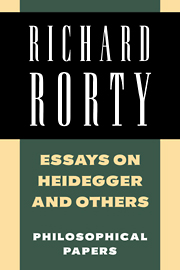Book contents
- Frontmatter
- Contents
- Acknowledgments
- Introduction: Pragmatism and post-Nietzschean philosophy
- Part I
- Part II
- Part III
- Freud and moral reflection
- Habermas and Lyotard on postmodernity
- Unger, Castoriadis, and the romance of a national future
- Moral identity and private autonomy: The case of Foucault
- Index of names
Unger, Castoriadis, and the romance of a national future
Published online by Cambridge University Press: 14 January 2010
- Frontmatter
- Contents
- Acknowledgments
- Introduction: Pragmatism and post-Nietzschean philosophy
- Part I
- Part II
- Part III
- Freud and moral reflection
- Habermas and Lyotard on postmodernity
- Unger, Castoriadis, and the romance of a national future
- Moral identity and private autonomy: The case of Foucault
- Index of names
Summary
Roberto Mangabeira Unger is a Brazilian philosopher. “Brazilian philosophy” has as little international resonance as “American philosophy” did a hundred years ago. But in 1882 Walt Whitman, comparing Carlyle's “dark fortune-telling of humanity and politics” with “a far more profound horoscope-casting of those themes – G. F. Hegel's,” wrote as follows:
Not the least mentionable part of the case, (a streak, it may be, of that humor with which history and fate love to contrast their gravity) is that although neither of my great authorities [Carlyle and Hegel] during their lives consider'd the United States worthy of serious mention, all the principal works of both might not inappropriately be this day collected and bound up under the conspicuous title: Speculations for the use of North America, and Democracy there, with the relations of the same to Metaphysics, including Lessons and Warnings (encouragements too, and of the vastest,) from the Old World to the New.
Try pasting that title on your copy of Unger's Politics, having first altered “North America” to “South America,” “Old World” to “Northern Hemisphere,” and “New” to “Southern.” The result would not be inappropriate. Though few of our great authorities presently consider Brazil worthy of serious mention, spaces left blank in the minds of one century's authorities often get filled in, quite quickly and quite surprisingly, during the next. Try beginning your reading of Unger's book with pages 64–79 of the first volume (“The Exemplary Instability of the Third World” and “A Brazilian Example”).
- Type
- Chapter
- Information
- Essays on Heidegger and OthersPhilosophical Papers, pp. 177 - 192Publisher: Cambridge University PressPrint publication year: 1991
- 5
- Cited by

